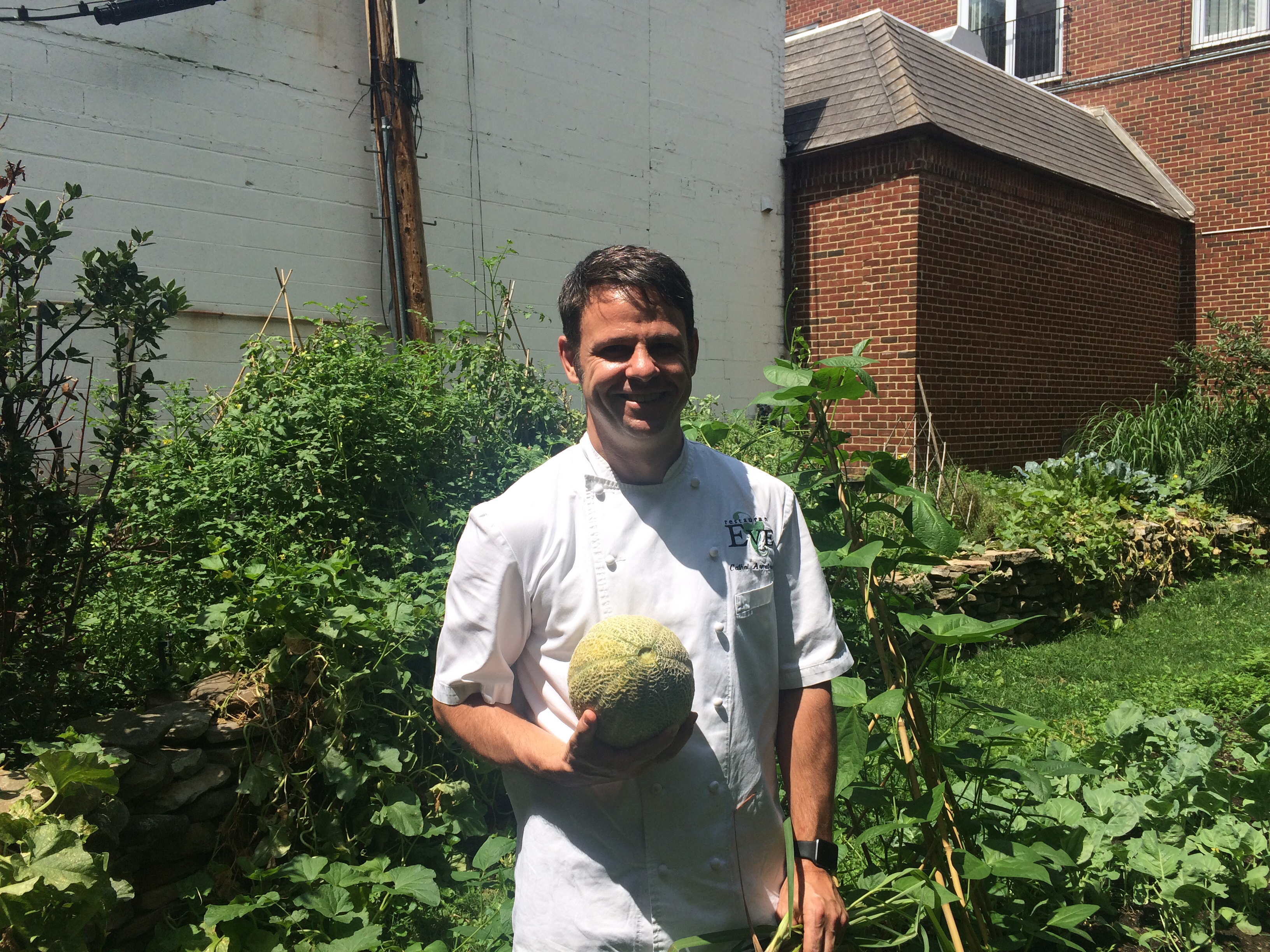WASHINGTON — On a sunny Friday afternoon, Chef Rob Weland is getting ready for a busy dinner service at his Barracks Row restaurant Garrison. Only, Weland isn’t in his whites, and he isn’t prepping ingredients or briefing the staff.
He isn’t even in the kitchen.
Weland is leaning over a cone-shaped cage that’s supporting young tomato vines, just a few feet from D.C.’s Southeast Freeway.
“It’s my favorite smell, a tomato leaf,” he said, over the sound of cars whizzing by. “I remember my grandfather had [tomatoes] when I was a kid, and I always remember that fondly.”
Twelve years ago, Weland instituted a practice that chefs all over the city have since adopted. On the patio at Poste, just a block from the Gallery Place/Chinatown Metro station, Weland started a garden with a few pots and some raised beds. He’s credited as the first chef in D.C. to do so.
But when Weland left Poste in 2011 with plans to open his own restaurant, he left behind the space he needed to grow tomatoes for his famed tomato salads — and the basil to top it.
Like most restaurants and businesses in the Capitol Hill neighborhood, Garrison, which Weland opened last summer, is in a rowhouse-type building. There’s no room on either side for a garden; a sushi restaurant occupies the second floor and roof.
So Weland did the next best thing: He put his name on a waiting list for a local community garden, just a few blocks from the restaurant. When a spot opened up this spring, Weland got to work planting.
With the sound of mufflers, horns and sirens in such proximity (“It doesn’t get any more urban than this,” Weland said), the location may not seem ideal for gardeners seeking serenity. But to Weland, any garden is better than no garden.
“Even though we’re next to a highway, it’s still got a lot of life,” he said. “Next to being in the restaurant on a day-to-day basis, this is my favorite place to be. I love it out here.”
This summer, Weland is devoting most of the space in his modest plot to heirloom tomatoes — he’s planted 18 different varieties. Basil, sweet onion and sugar snap peas occupy the remaining square footage.
To bulk up the restaurant’s produce selection, Weland partnered with Mike Protas of One Acre Farm, and he is even supplementing with a few ingredients from his home garden.
“There’s nothing like that flavor; I was taught that a very long time ago. There’s nothing like picking something and then serving it to a guest. To me, it’s night and day,” he said.
And while homegrown ingredients augment the flavors on Weland’s vegetable-heavy menu, he says having a restaurant garden is about so much more than the food harvested: It’s education.
“I can’t think of a stronger connection than to have the cooks or the externs from culinary school go outside and pick the fruit or the herb that they’re going to be using,” he said.
“I think the important lesson to teach young cooks is something that’s just picked and used right away is a totally different flavor profile — it’s much more aromatic and it certainly lasts a lot longer. It’s just a beautiful thing. And it’s healthier.”
Space requirements aside, there are other challenges when it comes to maintaining a restaurant garden. The biggest one is time — especially for chefs, who work long and brutal hours.
“It needs attention: You have to weed it, you have to water it, you have to give it love,” Weland said. “People tend to forget about it once it’s planted. It’s not a once-a-week thing.”
Weland may have pioneered restaurant gardens in the city, but he is no longer alone in the movement. He says these days most chefs look to incorporate gardened ingredients on their menus on some level — “whether it’s rooftops on hotels or utilizing any square footage that has [sun] exposure.”
Chef John Mooney of Bidwell farms for his restaurant on the rooftop at Union Market. Restaurant Eve’s chef, Cathal Armstrong, makes use of a private lot next to his Alexandria eatery.
At Garrison, Weland’s focus is on the next generation.
“If I inspire a couple of cooks, a couple of externs, that’s all I’m looking to do,” he said.







